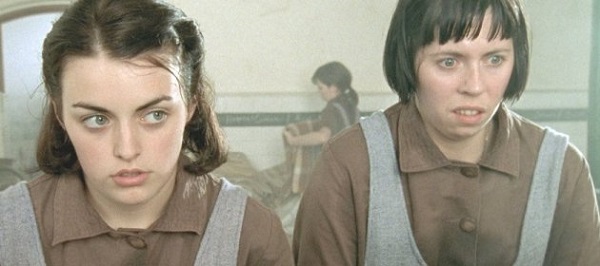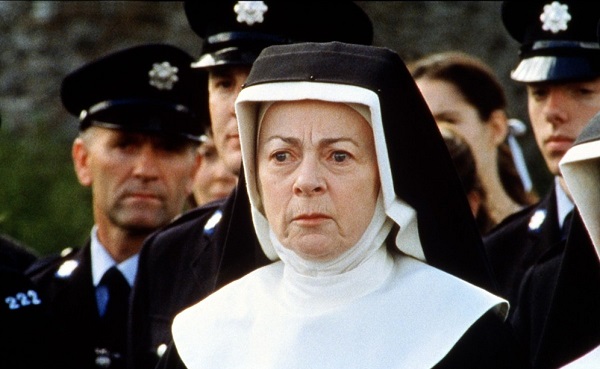Britflix: The Magdalene Sisters
The Magdalene Asylums and the treatment an estimated 30,000 'fallen' women is one of the great shames on the Irish nation and the Catholic Church, which the Irish government only apologized for in 2013. The British-Irish co-production of
The Magdalene Sisters set out to tell the true story of a group of young women who suffered at the hands of the Church and their families.
Starting in 1964,
The Magdalene Sisters focuses on three women, Margaret (Anne-Marie Duff) who is raped by her cousin during a wedding, Rose (Dorothy Duffy) who had a child out of wedlock and was forced to give him up for adoption and Bernadette (Nora Jane Noone), a teenage orphan who has the audacity to flirt with boys and is sent to the asylum, even though she is a virgin. At the asylum, each the woman all have to atone for their 'sins', through hard labor in the laundries, participating in prayer and can only be freed on the grace of the Mother Superior Sister Bridget (Geraldine McEwan).
 The Magdalene Sisters
The Magdalene Sisters has a rape scene within the first five minutes sets the tone that this is going to be a bleak, hard-hitting drama about a truly appalling institution. Writer-director Peter Mullan felt this was a story that he needed to tell. Mullan does showcase the physical and mental abuse that these women went through, who were humiliated, dehumanized and used as slave labor. The nuns of this institution are made out to be sadists who use Catholic beliefs as a justification and a method of control on the women, while Mullan shows the hypocrisy of the church in its various forms.
The Magdalene Sisters is mostly set in a small, claustrophobic environment and Mullan uses this microcosm to explore some wider psychological and sociological. The character of Katy (Britta Smith), a woman who had been in the asylum for 40 years, is so institutionalized, that she acts as an extra enforcer for the nuns, under the hope she can complete a pendant. All of the other women are completely rejected by their families and have to join the order because they have nowhere else to turn.

When Mullan does take us outside of the asylum he portrays the conservative nature of Irish society at the time. The public look down the women when they are allowed out, seen as the lowest of the low, the state offering some complicity, as police occasionally help the nuns. On the other side of the coin, young men see the women of the asylum as easy because of their reputation for being 'whores' and 'sluts'.
Each of the actors give their all for the movie and they had given the heavy material. The movie is blessed with a talented cast and for many of the actresses,
The Magdalene Sisters is their biggest credit. The tragedy is played to the fullest, as these women suffer inside and outside the asylum, yet Rose and Margaret keep their kind aspects of their characters and Bernadette reminds a fiery woman who does not crack to the punishment she has received. In comparison the naive and kind-hearted Crispina (Eileen Walsh), a young woman with properly learning disabilities, who is abused in various forms and is the character who suffers the most.
Mullan made an incredibly important movie, looking at tragic historic story where many women suffered. This is a movie that is furious towards the Catholic Church and Mullan does portray many hard scenes in physical and emotional abuse, filled with violence and nudity. It is a tough yet rewarding watch. But if you think the treatment the women suffered in this dreadful Mary-Jo McDonagh, a former Magdalene inmate said that the reality was even worst.
 The Magdalene Sisters has a rape scene within the first five minutes sets the tone that this is going to be a bleak, hard-hitting drama about a truly appalling institution. Writer-director Peter Mullan felt this was a story that he needed to tell. Mullan does showcase the physical and mental abuse that these women went through, who were humiliated, dehumanized and used as slave labor. The nuns of this institution are made out to be sadists who use Catholic beliefs as a justification and a method of control on the women, while Mullan shows the hypocrisy of the church in its various forms.
The Magdalene Sisters is mostly set in a small, claustrophobic environment and Mullan uses this microcosm to explore some wider psychological and sociological. The character of Katy (Britta Smith), a woman who had been in the asylum for 40 years, is so institutionalized, that she acts as an extra enforcer for the nuns, under the hope she can complete a pendant. All of the other women are completely rejected by their families and have to join the order because they have nowhere else to turn.
The Magdalene Sisters has a rape scene within the first five minutes sets the tone that this is going to be a bleak, hard-hitting drama about a truly appalling institution. Writer-director Peter Mullan felt this was a story that he needed to tell. Mullan does showcase the physical and mental abuse that these women went through, who were humiliated, dehumanized and used as slave labor. The nuns of this institution are made out to be sadists who use Catholic beliefs as a justification and a method of control on the women, while Mullan shows the hypocrisy of the church in its various forms.
The Magdalene Sisters is mostly set in a small, claustrophobic environment and Mullan uses this microcosm to explore some wider psychological and sociological. The character of Katy (Britta Smith), a woman who had been in the asylum for 40 years, is so institutionalized, that she acts as an extra enforcer for the nuns, under the hope she can complete a pendant. All of the other women are completely rejected by their families and have to join the order because they have nowhere else to turn.
 When Mullan does take us outside of the asylum he portrays the conservative nature of Irish society at the time. The public look down the women when they are allowed out, seen as the lowest of the low, the state offering some complicity, as police occasionally help the nuns. On the other side of the coin, young men see the women of the asylum as easy because of their reputation for being 'whores' and 'sluts'.
Each of the actors give their all for the movie and they had given the heavy material. The movie is blessed with a talented cast and for many of the actresses, The Magdalene Sisters is their biggest credit. The tragedy is played to the fullest, as these women suffer inside and outside the asylum, yet Rose and Margaret keep their kind aspects of their characters and Bernadette reminds a fiery woman who does not crack to the punishment she has received. In comparison the naive and kind-hearted Crispina (Eileen Walsh), a young woman with properly learning disabilities, who is abused in various forms and is the character who suffers the most.
Mullan made an incredibly important movie, looking at tragic historic story where many women suffered. This is a movie that is furious towards the Catholic Church and Mullan does portray many hard scenes in physical and emotional abuse, filled with violence and nudity. It is a tough yet rewarding watch. But if you think the treatment the women suffered in this dreadful Mary-Jo McDonagh, a former Magdalene inmate said that the reality was even worst.
When Mullan does take us outside of the asylum he portrays the conservative nature of Irish society at the time. The public look down the women when they are allowed out, seen as the lowest of the low, the state offering some complicity, as police occasionally help the nuns. On the other side of the coin, young men see the women of the asylum as easy because of their reputation for being 'whores' and 'sluts'.
Each of the actors give their all for the movie and they had given the heavy material. The movie is blessed with a talented cast and for many of the actresses, The Magdalene Sisters is their biggest credit. The tragedy is played to the fullest, as these women suffer inside and outside the asylum, yet Rose and Margaret keep their kind aspects of their characters and Bernadette reminds a fiery woman who does not crack to the punishment she has received. In comparison the naive and kind-hearted Crispina (Eileen Walsh), a young woman with properly learning disabilities, who is abused in various forms and is the character who suffers the most.
Mullan made an incredibly important movie, looking at tragic historic story where many women suffered. This is a movie that is furious towards the Catholic Church and Mullan does portray many hard scenes in physical and emotional abuse, filled with violence and nudity. It is a tough yet rewarding watch. But if you think the treatment the women suffered in this dreadful Mary-Jo McDonagh, a former Magdalene inmate said that the reality was even worst.